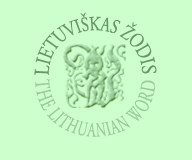-
- The two swimmers carefully pushed their
water-proof wrapped bundles onto the sloping riverbank and slipped
silently out of the water. Shaking themselves like dogs to rid their
bodies of as much water as possible, they hurriedly donned the clothes
that were secured to the top of the bundles. For some time before
darkness fell they had lain hidden on the opposite riverbank, timing the
frequency of any border
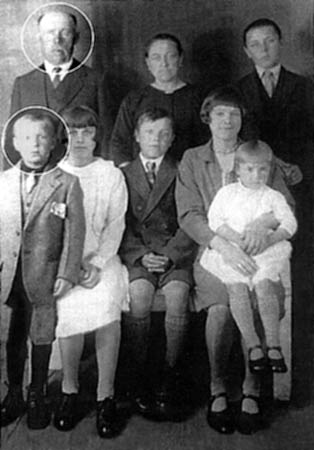 guard
patrols and choosing a landing area on the other side. Although the
river was not particularly wide at this point, the current was
reasonably strong and rather than fight it they planned to allow the
current to aid them in a diagonal crossing. Dressed, they hoisted the
packs by the rope harness, adjusted them on their backs, and set off for
the pre-arranged rendezvous with their colleagues. They had some ten
kilometers to cover during the short hours of summer darkness, avoiding
any military patrols enroute. guard
patrols and choosing a landing area on the other side. Although the
river was not particularly wide at this point, the current was
reasonably strong and rather than fight it they planned to allow the
current to aid them in a diagonal crossing. Dressed, they hoisted the
packs by the rope harness, adjusted them on their backs, and set off for
the pre-arranged rendezvous with their colleagues. They had some ten
kilometers to cover during the short hours of summer darkness, avoiding
any military patrols enroute.
- The year was 1899, the country was
Lithuania, the river was the Sesupe, which at that point was the border
between East Prussia and Lithuania, before it merged with the Nemunas,
Lithuania's largest river, which then became the border. The two
swimmers were my father, Vincentas (Vincas) Stepsis, and my uncle
Juozas, both of whom were smugglers - in the literal sense of the word -
as the bundles they carried, according to the occupying Imperial Russian
authorities, contained illegal material. However, the contraband they
carried across the frontier of the two countries was not to evade
revenue payable on taxable commodities, nor were they doing so for
personal gain
or profit. They were risking their lives, incarceration, or banishment
to the frozen wastes of Siberia for nothing more than Lithuanian
language literature - books, journals, newspapers - which would be
secretly disseminated to their fellow countrymen; the hazardous task
voluntarily undertaken without any thought of gain or glory.
- But why was it necessary to bring their
own-language literature into the country covertly and at the risk of
life and limb? Why would ordinary country - folk - peasants - at best
only semi-literate undertake such risky, dangerous missions for the sake
of printed paper? Why, indeed, had this to be done clandestinely and why
was apprehension by the Russian authority so severely punished? To
comprehend the why and the wherefore thousands of people like Vincas and
Juozas Stepsis gladly did this task, despite the consequent hazards, it
is necessary to understand something of the troubled history of the
ancient land of Lithuania. By virtue of a 16th century treaty with
Poland, a "Commonwealth of Two Nations" had lasted more than
two hundred years until the Third Partition of the Commonwealth in 1795
resulted in Lithuania being seized by Imperial Russia. During the 19th
century, as with most occupied and subjugated countries, there were
uprisings and insurrections against the occupying authority. After the
1863 insurrection was quashed, Tsar Alexander the Second imposed the
most stringent of measures on Lithuania and its people. He installed a
Governor General, one Mikhail Nikolaevich Muravyov, with instructions to
produce a Lithuania "with nothing Lithuanian in it." Muravyov
began his implementation of the Tsar's orders by proclaiming a complete
ban on the Lithuanian press,
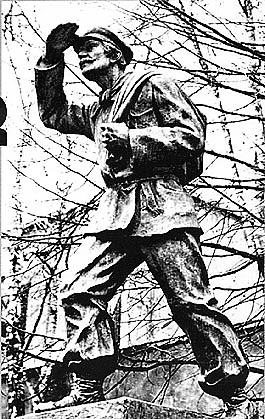 the
usage of the Latin alphabet and the Lithuanian language - only the
Cyrillic alphabet and Russian language were to be used and taught. In
essence everything Lithuanian - language, culture, the
usage of the Latin alphabet and the Lithuanian language - only the
Cyrillic alphabet and Russian language were to be used and taught. In
essence everything Lithuanian - language, culture,
religion - was proscribed, and so severe were the penalties for
contravention that, during his time as Governor-General (till March
1865) Muravyov became known as the "Hangman of Lithuania."
- The period from 1864 to 1904 when the ban
was lifted, made the native Lithuanian press nonexistent resulting in an
unrelenting struggle to restore it. In all of European history Lithuania
is the prime instance of an occupying authority denying a former
independent nation its language and press and a people's forty-year
battle against a foreign language and culture being forced upon them. It
is no wonder that the time of the prohibition became known in Lithuania
as the "Forty Years of Darkness."
- An underground movement began printing the
forbidden literature in their native tongue across the border in East
Prussia. Originally inspired by the clergy, particularly Bishop Motiejus
Valancius whose rallying call was "Visada ir visur buk
lietuvis" ("Always and everywhere be Lithuanian") and who
exhorted everyone to discard the Russian books and keep teaching the old
Lithuanian language, even if in secret. In answer to his call, men who
were themselves unable to read or write, ferried the packages of books
across the border and distributed the contents. And so the knygnesiai
(book-carriers) came into being. The womenfolk taught the children at
their knee during the performance of the daily domestic chores. Both
Tsar Alexander and Muravyov completely underestimated the nationalism,
resilience, and stubbornness of the Lithuanian people. The more
repressive the measures they inflicted, the greater grew the resistance.
On that night in 1899, my father and my uncle Juozas delivered their
bundles to the distribution center in the village of Pilviskiai before
dawn and spent the daylight hours resting and sleeping at the house of a
friend and fellow "smuggler." As darkness fell that evening,
they made preparations to return to the Sakalupio area; having said
their farewells they set off. About two kilometers or so from their
hideaway, a figure loomed up in the gloom in front of them and the voice
of the local policeman said: "Ah! Vincai, Juozai, I would not go
home tonight." Not another word was said or needed. The brothers
understood, the military were waiting for them. Turning their footsteps
toward the Sesupe river, they swam across to the East
Prussian bank intending to lie low with their book-smuggling colleagues
until the authorities gave up the search for them.
Four weeks later word reached the brothers that they were still being
vigorously sought after, the hue and cry had not diminished as they had
hoped. After some soul searching they decided it would be disastrous to
return to Lithuania for some foreseeable time with incarceration or
Siberia as the only future facing them. The only choice was to bid
farewell to their native land, their usefulness as covert book-carriers
gone, and head west-to the land of opportunity and freedom, the United
States of America. Working their way across Prussia and Germany to the
port of Hamburg they found they had insufficient funds for the fare to
America. Almost exactly twelve months from their encounter with the
friendly policeman, the boat they were on docked at the Port of Leith,
Scotland. Vincas Stepsis was born on the 9th of July 1870, his brother
Juozas two years later, at Sakalupio Dvaras (estate), near the town of
Kudirkos Naumiestis, Lithuania, about two kilometers from the banks of
the Sesupe river, to Tadas Stepsis and his wife Petronele Barzdaityte
Stepsiene. His father Tadas (my grandfather) died when Vincas was 4
years old and my grandmother Petronele died shortly before Vincas
reached his 10th birthday. Orphaned in childhood, the two boys worked
from that early age on the Sakalupio estate where their father had been
coachman to the dvarininkas (estate owner). On reaching the age
of 21, Vincas was conscripted for military service in the Imperial
Russian Army on 12th November 1891, and posted to the 6th Battery, 3rd
Brigade Grenadiers Artillery on 10th December 1891, far away from his
homeland, in the Ukraine. Two a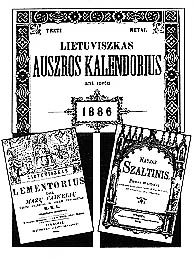 nd
a half years later he was lying in a bed of a military hospital in
Rostov with a fractured skull where a horse had kicked him about an inch
above his right eye. While hovering between life and death, a court of
inquiry, held at nd
a half years later he was lying in a bed of a military hospital in
Rostov with a fractured skull where a horse had kicked him about an inch
above his right eye. While hovering between life and death, a court of
inquiry, held at
his bedside, ruled that he was no longer fit for any military duties and
should be released from any further service. His discharge booklet
entitled "Certificate of Completion of Military Service, No.
286" says: "The bearer of this is a cannoneer, Vikenty
Tadeusovich Stepshis... after examination on 5th February 1894, the
Commission held in a military hospital recognized his incapacity to
continue military service and gave him his discharge. Stepshis is
incapable to continue either combatant or non-combatant service and so
discharged from the military service forever. Capable of private labor.
Not requiring care. At the time of his arrival at his place of
residence, Stepshis is obliged to report at the local police station
with this Certificate to reregister in his local community." On
returning home after making a complete recovery from his dreadful injury
(which the Russian Commission had thought highly unlikely), Vincas found
that his brother had not complied with his Above: The Sesupe
River, near Kudirkos Naumiestis.
- Right:
Some of the banned books "smuggled" into Lithuania from East
Prussia by the knygnesiai. Opposite page: Last page of the
Certificate of Completion of Military Service of Vincentas Stepsis (1894).
call-up to the Russian Army but had joined the local
"underground" as a covert book-carrier. Within a week Vincas and
Juozas were a two-man unit in the team of smugglers. As border dwellers
from birth, they were familiar with the whole area and knew all the nooks
and crannies from their boyhood adventures. For the next five years the
brothers carried out their book-carrying exploits, miraculously avoiding
apprehension by the occupying authorities, until the night in 1899, when
they were, fortunately, warned allowing them to evade certain capture.
Although I was born in Scotland, my first language was Lithuanian, taught
by my mother who, unlike my father, was literate and I spent my
impressionable childhood years listening to, and begging for, tales of the
"old country"-its history, its occupation and subjugation, and
the struggles to retain the language and literature; not just told by my
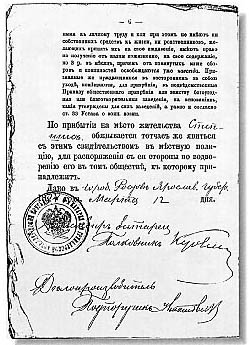 father
but by his friends, like Juozas Kasulaitis, a fellow knygnesys,
when they all gathered socially in our house. A boy's eagerness for blood
and thunder stories prompted me to ask if they ever ran into trouble, were
they ever shot at by Russian soldiers when crossing the border? The short
answer was: "No, we were lucky." There were occasions as a child
when the tales I heard seemed so fantastic to me living in Scotland that I
thought they were fictional stories, like fairy tales told to satisfy a
youngster's demand for a bedtime story. Not until I visited Lithuania for
the first time in 1993, when I was welcomed as the son of a knygnesys,
did I fully realize just how understated my father's stories really were.
I still have a memento of my father's book-carrying days - my mother's
prayer book-titled "Szaltinis" ("The Wellspring") - it
has been confirmed as one of the "illegal" publications by the
Lithuanian National Archives, probably published between 1894 and 1899.
The struggles of the book-carriers have been praised in modern times by
Father Julijonas Kasperavicius who said: "The work of restoring
Lithuania's independence began, not in 1918, but rather at the time of the
book-carriers. With bundles of books and pamphlets on their backs, these
warriors were the first to start preparing the ground for independence,
the first to propagate the idea that it was imperative to throw off the
yoke of Russian oppression." In any other country a smuggler as an
ancestor would probably be cause for embarrassment but, as the son of a
Lithuanian "smuggler" of the 19th century, I have no sense of
shame or embarrassment. The very opposite, for I have a heartstirring
pride that my immediate ancestor was one of the warriors described by
Father Kasperavicius and had been a hero - however minor - of his country
and his, and his many colleagues' exploits are part of the folklore of his
native land. father
but by his friends, like Juozas Kasulaitis, a fellow knygnesys,
when they all gathered socially in our house. A boy's eagerness for blood
and thunder stories prompted me to ask if they ever ran into trouble, were
they ever shot at by Russian soldiers when crossing the border? The short
answer was: "No, we were lucky." There were occasions as a child
when the tales I heard seemed so fantastic to me living in Scotland that I
thought they were fictional stories, like fairy tales told to satisfy a
youngster's demand for a bedtime story. Not until I visited Lithuania for
the first time in 1993, when I was welcomed as the son of a knygnesys,
did I fully realize just how understated my father's stories really were.
I still have a memento of my father's book-carrying days - my mother's
prayer book-titled "Szaltinis" ("The Wellspring") - it
has been confirmed as one of the "illegal" publications by the
Lithuanian National Archives, probably published between 1894 and 1899.
The struggles of the book-carriers have been praised in modern times by
Father Julijonas Kasperavicius who said: "The work of restoring
Lithuania's independence began, not in 1918, but rather at the time of the
book-carriers. With bundles of books and pamphlets on their backs, these
warriors were the first to start preparing the ground for independence,
the first to propagate the idea that it was imperative to throw off the
yoke of Russian oppression." In any other country a smuggler as an
ancestor would probably be cause for embarrassment but, as the son of a
Lithuanian "smuggler" of the 19th century, I have no sense of
shame or embarrassment. The very opposite, for I have a heartstirring
pride that my immediate ancestor was one of the warriors described by
Father Kasperavicius and had been a hero - however minor - of his country
and his, and his many colleagues' exploits are part of the folklore of his
native land.
-
- John Millar (Jonas Stepsis) is a regular
contributor to Lithuanian Heritage living in Fairlie, Scotland.
Recently he was awarded a Winston Churchill Fellowship which allowed him
to travel to Lithuania to research the history of the
"book-carriers." The only extant photograph of Vincas Stepsis
(a.k.a. William Millar - rear), taken in 1930 in Scotland, with his
family. Next to him are his wife Petronele (formerly Domeikiene) and
Joseph Domeika. The author (aged 7) is in the front row, accompanied by
sister Mary (on knee), half-sisters Alice and Ann, and half-brother Peter.
|
